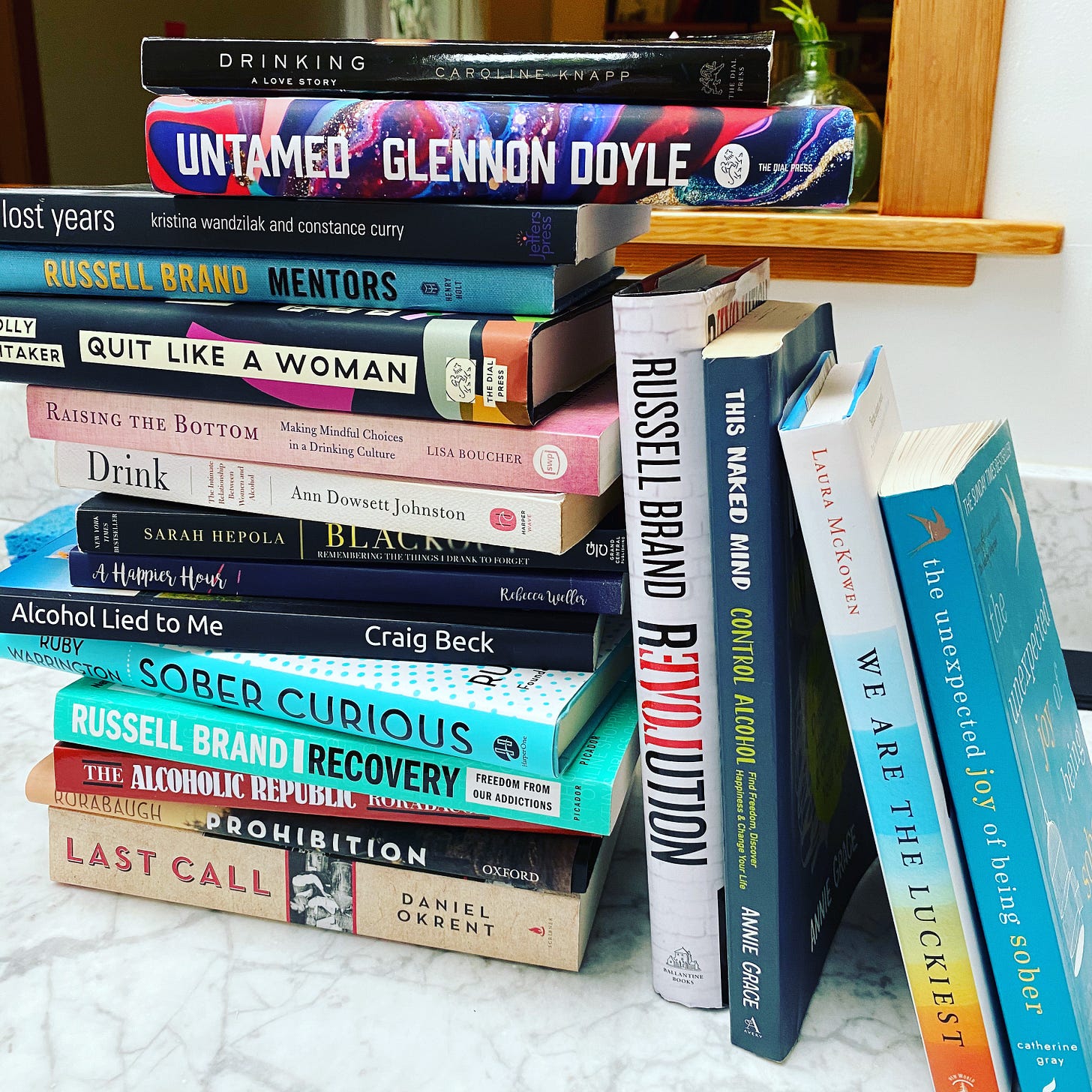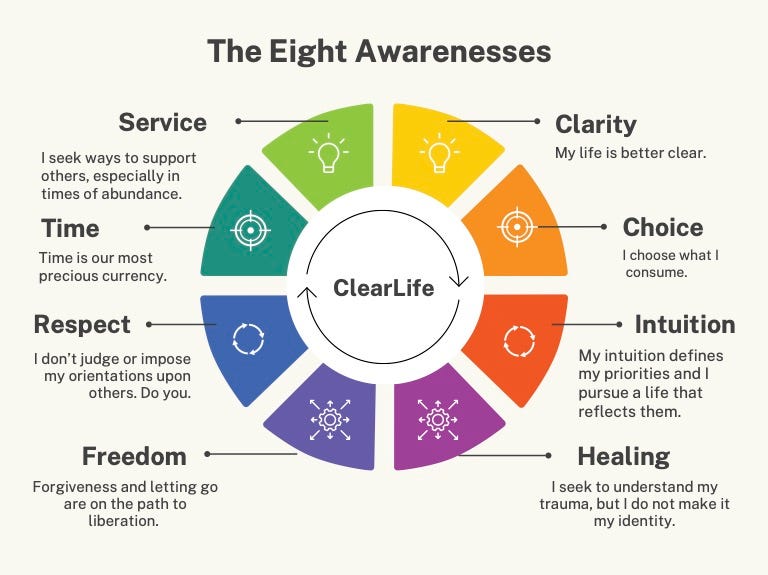TGIF :: The Eight Awarenesses
Weekly drop #23 || Genesis, overview, and implementation of a stigma-free path to transformation with intention, choice, and grace.
Since Introducing The Eight Awarenesses, An Alternative to the Twelve Steps in June, I’ve appreciated juicy exchanges with many of you. From constructive critiques to heartfelt gratitude, the messages that resonate most sound like “Thank you for seeing me. I thought I was the only one looking for a different way to change.”
There is a rich tapestry of stories, needs, desires, and dreams among us. Yet, we seem to universally yearn to shift something (big or small) from within—from a place of choice, not surrender.
This week’s post offers a summary of The Eight Awarenesses (“TEA”) along with practical application tips. While the primary focus is on alcohol, longtime readers know it’s relevant to any dimming habit, be it excessive spending, workaholism, or even over-exercise. Thank you for your continued engagement and sharing. ❤️
The ClearLife Movement
A growing number of people are shifting their relationship with alcohol, choosing to drink less or not at all. Motivations are varied but include vanity, weight loss, and an interest in improving overall physical and mental health.
For many, moderating or abstaining is difficult. This is nothing to be ashamed of. Alcohol is addictive. Whether it’s the habitual pull towards a drink on familiar occasions (hello, Friday night!) or adapting to social scenarios without it, dialing down or stopping altogether isn’t easy.
It’s daunting, especially given the long-held narrative: “Drink responsibly, and if you can’t, seek help—you’re an alcoholic.” This label carries a stigma, an identity that few want to take on. It’s also simply not true.
The good news is: The vast majority of drinkers, even daily drinkers, aren’t addicted to alcohol to the point where we can’t stop. A drinking habit may be tough to break, but with the right intentions, mindset, and support, we can shift our relationship with it, cutting back or stopping altogether—without a diagnosis, a detox, or a rehab.
Today’s post outlines The Eight Awarenesses, a method for adjusting one’s relationship with alcohol (or any dimming or escapist behavior). It’s an approach that is available to anyone in the vast middle between “don’t drink” and “full-blown addict.”
First, some context
For nearly a century, Alcoholics Anonymous (“AA”) and The Twelve Steps—starting with admitting “powerlessness over alcohol” have been the dominant method for those seeking to quit drinking. While this approach has transformed the lives of hundreds of thousands of people people, it’s failed just as many. There is no universal solution to managing addictive or escapist habits.
In 2017 I spontaneously took a break from drinking. What began as a month extended to three and eventually culminated in a full year “clear.” While certain aspects of this journey felt natural, like the act of abstaining itself, others posed real challenges. Adapting socially, articulating my decision, confronting long-avoided emotions, and questioning whether this was a temporary experiment or a lifelong commitment were among the tougher parts.
In that first year I researched all kinds of tools and approaches to living alcohol free including AA and The Twelve Steps. While I maintain high regard for AA and love that it has helped so many—including some dear people in my own life—it didn’t suit my needs. I didn’t perceive myself as “powerless,” I don’t identify as an “alcoholic,” and I wasn’t inclined to hand my fate over to God to save me.
The changes I was making felt like important choices. I eventually learned this was because I was in the “Abuse” category of the vast Use, Abuse, Addict spectrum, no longer a causal drinker, but not an addict either.
Like many of you, I eventually recognized that any behavioral changes would need to stem from inner work: discerning the origins of escapist tendencies, cultivating self-trust, and healing to eliminate the need to “dim.” Despite best efforts, I never found a program or framework that resonated with this perspective of empowerment, liberation, healing, and autonomy.
Rewriting The Twelve Steps
Deep down I am a delicate and creative soul buried beneath years of business conditioning and legal training. Still, I have a soft spot for a well-structured framework. I appreciate shared tools and methodologies with clear steps that simplify complex journeys. I yearned for a versatile approach, something I could share and adapt to ever-changing needs.
So standing at my kitchen counter in 2018, I copied The Twelve Steps into a Word document and started editing.
At first there were a few changes, then the mark-ups became more comprehensive as I opened the document from time to time to make updates to reflect my experience and that of the global community I was connecting with online (primarily Instagram).
For example, The First Step “We admitted we were powerless over alcohol — that our lives had become unmanageable” became “It is up to me whether I consume alcohol. I know that my life is better without it.”
The Eight Awarenesses
After years of tinkering, experimentation, and research, I ended up with The Eight Awarenesses (each header links to a prior newsletter deep dive):
Clarity. My life is better clear.
Choice. I choose what I consume.
Intuition. My intuition defines my priorities and I pursue a life that reflects them.
Healing. I seek to understand my trauma, but do not make it my identity.
Freedom. Forgiveness and letting go are on the path to liberation.
Respect. I don’t judge or impose my limitations on others.
Time. Time is our most precious currency.
Service. I seek ways to support others, especially in times of abundance.
These can also be viewed in a cycle:
How to Apply The Eight Awarenesses (“TEA”)
There is no one way. How we apply TEA is up to us. The goal is to wield it as a compass on our journey towards clarity. It could be as straightforward as acknowledging these awarenesses in tandem with our daily lives or delving deep into one, especially a resonant one, until its potency has worked its magic. Based on my experiences and insights from many of you, here are a few recommendations:
Settle into the First Awareness first.
Anyone who’s tried to shift an habit or help a fellow human navigate addictive tendencies knows that it is an inside job. Without a commitment to change within the individual, there is no point in trying to shift behavior, especially someone else’s.
The First Awareness: My life is better clear, is the first for a reason. It’s a the foundational principle to revisit, especially in moments of doubt, grounding us in our reasons for transformation. It is the seed of desire for change. As a building block to the rest of the journey, we can dwell on it for as long as necessary—even years. This could be years. Once we genuinely embrace the readiness for change, the rest will flow more easily.
Then pick one and let it “be” with you for the week.
For example, the Seventh Awareness on time comes up a lot for me these days. Am I spending time in a way that maps to my priorities? Am I neglecting something important? Am I “wasting” time on tasks or activities that don’t feel aligned? Choosing one and focusing on it for a week or more can come with a lot of insights.
Find your alone time, preferably in nature.
Because this is inner work, we need the time and space to explore, examine, reflect, and allow for changes to settle in at all levels of our being (mental, physical, emotional). Even a ten minute walk outside can be nourishing, but occasional deep dives in solitude, in nature, are ideal. We need to be able to tune in without the distractions and noise of everyday life.
Be kind to yourself.
Change is hard. Frustration, shame, anger, disappointment—you name it—they’ll come up. The opportunity is to actually feel these feelings, take the space and time to experience them, and then let them go. Give yourself a lot of grace if you’re finding yourself tangled up inside with starts and stops and everything in between.
Seek out community.
Most ClearLife journeys are within us, but also benefit from community. I found enormous inspiration and support on Instagram in my early days from several gifted trailblazers including
, , , , and more recently. Whether it’s online support, local gatherings of similarly-oriented folks, or even the solace of a relatable podcast, finding people who share our perspective and goals is incredibly nourishing.Don’t underestimate the power of meditation.
Whether it’s a brief moment of stillness or a structured daily practice, setting aside inactive moments to connect and tune in enhances our self-awareness, fosters balance, and hones our ability to truly listen to ourselves.
Stay curious!
There is no “right” or “wrong” approach to shifting one’s path, habits, or tendencies. Each of us must discover and tailor what resonates with our unique needs. With an open heart and mind, we can embrace the tools and lessons that best serve our personal journey.
Now what?
Following a trajectory similar to that of Big Tobacco, research is confirming what many have suspected for a long time: Alcohol, even in moderation, is bad for our mental and physical health. Amidst the wave of increased interest in wellbeing generally, we’re drinking less.
Lucky for us, there is an expanding array of tools, methodologies, perspectives, and support systems available to guide us. If The Eight Awarenesses approach resonates with you, experiment with it. See what awarenesses seem particularly relevant to your path, then explore another. Reach out with questions and feedback. Join one of our zooms or local gatherings in Marin. More than anything else, listen to yourself and remember that you get to choose how you want to spend this this precious life.
More soon. Onward. ❤️
Miscellaneous…
My dear friend and WVF partner Yung Pueblo is going on tour to celebrate the launch of his new book, The Way Forward. I am honored to share that I’ll be interviewing him at his San Francisco stop on October 18th. Tickets here (they will sell out!). ✨
As a houseplant mom… I am always trying to better understand how to care for all of the “greenery kids.” I was reminded of some great advice from my friend Mel (learned from her mom) this week: “The trick to healthy and vibrant houseplants is to throw them away when they die.” Amen, sister. 💌
ClearLife HQ is born...! After years of working at the kitchen table/counter or the occasional cafe or airplane tray, I have an office. It’s a special spot up some bamboo lined brick steps I called home for a few precious years “between lives.” IRL Sangha Saturdays will take place here starting this month with our first zoom version tomorrow, September 9th. Invitations available via this form. 💥







Thank you for the mention, Cecily! So much resonance for me, reading about your path here. When I stopped drinking in early 2020, I was drinking 2 glasses of wine a night. That's it. And, that was too much and was deeply unhelpful. In choosing to get sober, I wasn't powerless. I was empowered.
Yes. Yes. Yes. And yes.